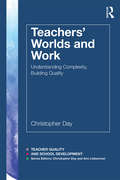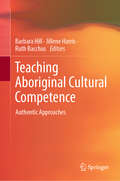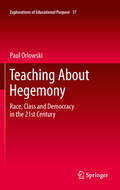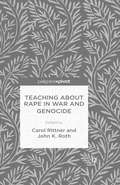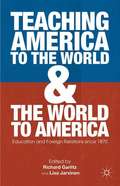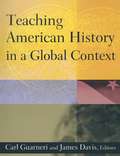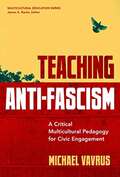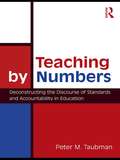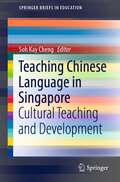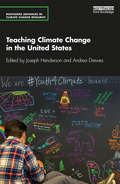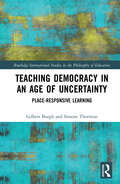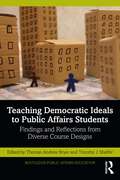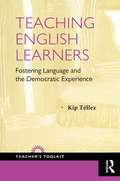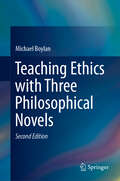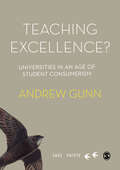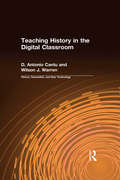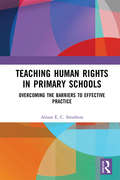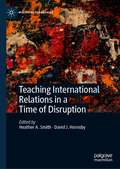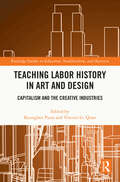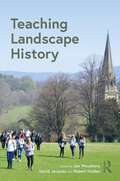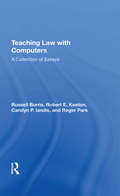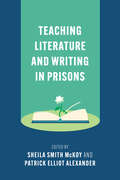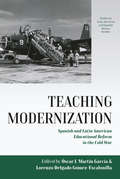- Table View
- List View
Teachers’ Worlds and Work: Understanding Complexity, Building Quality
by Christopher DayUnderstanding what influences the quality of teachers’ work across a career is key to building and sustaining their on-going commitment and effectiveness. Teachers’ Worlds and Work provides a new, research-informed consideration of key elements which independently and together influence teachers' work and lives: policy and workplace conditions, teacher professionalism, identity, emotions, commitment and resilience, types of professional learning and development, and the importance of the contribution to these made by high-quality leadership. In bringing these elements together, the book provides new, detailed and holistic understandings of their influence and suggests ways of building and sustaining teachers' abilities and willingness to teach to their best and well over their careers. This groundbreaking text will be essential reading for teacher educators, teachers, head teachers and academics.
Teaching Aboriginal Cultural Competence: Authentic Approaches
by Barbara Hill Jillene Harris Ruth BacchusThis book examines a collaborative partnership model between academia and Indigenous peoples, the goal of which is to integrate Indigenous perspectives into the curriculum. It demonstrates how the authentic and creative approaches employed have led to an evolution of curriculum and pedagogy that facilitates cultural competence among Australian graduate and undergraduate students. The book pursues an interdisciplinary approach based on highly practical examples, exemplars and methods that are currently being used to teach in this area. It focuses on facilitating student acquisition of knowledge, understanding, attitudes and skills, following Charles Sturt University’s Cultural Competence Pedagogical Framework. Further, it provides insights into the use of reflective practice in this context, and practical ideas on embedding content and sharing practices, highlighting examples of potential “ways forward,” both nationally and globally.
Teaching About Hegemony
by Paul OrlowskiPolitical progressives in Canada and the United States are deeply concerned by the manner in which their countries treat their poor. They are dismayed at the dismantling of the social welfare state, the weakening of public education systems and the grotesque and ever-growing inequality of wealth. To remedy this problem, citizens need to be more aware of how political ideology influences attitudes and actions, and they need to better comprehend the effects of hegemonic discourses in the corporate media and school curriculum. This book informs educators how to develop context-specific pedagogy that will help achieve a more enlightened citizenry and, as a result, a stronger democracy. Teaching about Hegemony: Race, Class and Democracy in the 21st Century promotes a progressive agenda for teaching that is rooted in critical pedagogy, it explains why ideological critique is necessary in raising political consciousness, it deconstructs white, middle-class hegemony in the formal school curriculum, and it examines corporate media and school curriculum as hegemonic devices. It also covers recent theory and research about race, class and democracy and how best to teach about these topics. Combining theory and sociological research with pedagogical approaches and classroom narratives, this book is fundamental for progressive educators interested in developing a politically conscious, progressive and active citizenry hungry for a stronger civil society.
Teaching About Rape in War and Genocide
by John K. Roth Carol RittnerThis edited volume is both a guide for educators and a resource for everyone who wants to strengthen resistance against a major atrocity that besieges human development. Its contributors explore a crucial question: how to teach about rape in war and genocide?
Teaching America to the World and the World to America
by Richard Garlitz Lisa JarvinenA fresh analysis of the study of American foreign relations history, this book shows the ways in which international education has shaped the US relationship with the world.
Teaching American History in a Global Context
by Jim Davis Carl J. GuarneriThis comprehensive resource is an invaluable teaching aid for adding a global dimension to students' understanding of American history. It includes a wide range of materials from scholarly articles and reports to original syllabi and ready-to-use lesson plans to guide teachers in enlarging the frame of introductory American history courses to an international view.The contributors include well-known American history scholars as well as gifted classroom teachers, and the book's emphasis on immigration, race, and gender points to ways for teachers to integrate international and multicultural education, America in the World, and the World in America in their courses. The book also includes a 'Views from Abroad' section that examines problems and strategies for teaching American history to foreign audiences or recent immigrants. A comprehensive, annotated guide directs teachers to additional print and online resources.
Teaching Anti-fascism: A Critical Multicultural Pedagogy For Civic Engagement (Multicultural Education Ser.)
by James A. Banks Michael VavrusThis timely book examines how fascist ideology has taken hold among certain segments of American society and how this can be addressed in curriculum and instruction. Vavrus presents middle, secondary, and college educators and their students with a conceptual framework for enacting a critical multicultural pedagogy by analyzing discriminatory discourse and recommending civic anti-fascist steps people can take right now. For teacher education programs and policymakers, anti-fascist civic assessment rubrics are provided. To help clarify contemporary debates over what can be taught in public schools, an advance organizer highlights contested and misunderstood terminology. Featuring historical and contemporary patterns of fascist politics, this accessible text is organized in four parts: “Good Trouble,” Unpacking Ideological Orientations, Indicators of Colonial Proto-Fascism and U.S. Fascist Politics, and An Anti-Fascist “Reading the World.” Readers will come away with a deeper knowledge base that marshalls a century of anti-fascist actions in response to contemporary acts of racism, anti-Semitism, Islamophobia, gender and sexuality discrimination, bias against Latinx and migrant populations, and other actions that undermine our democracy and harm marginalized students and their families and communities. Book Features: A groundbreaking framework for incorporating anti-fascist pedagogical concepts into multicultural education Descriptions of common characteristics of historical fascism, far-right extremism, and anti-fascism. Anti-fascist assessment rubrics for teacher educators. Guidance to assist classroom teachers in contextualizing current anti-democracy events. Recommended and annotated anti-fascist background readings informed by critical, theoretical, and intersectional perspectives.
Teaching By Numbers: Deconstructing the Discourse of Standards and Accountability in Education (Studies in Curriculum Theory Series)
by Peter Maas TaubmanOver the last decade the transformation in the field of education that is occurring under the twin banners of "standards" and "accountability" has materially affected every aspect of schooling, teaching, and teacher education in the United States. Teaching By Numbers, offers interdisciplinary ways to understand the educational reforms underway in urban education, teaching, and teacher education, and their impact on what it means to teach. Peter Taubman maps the totality of the transformation and takes into account the constellation of forces shaping it. Going further, he proposes an alternative vision of teacher education and argues why such a program would better address the concerns of well-intentioned educators who have surrendered to various reforms efforts. Illuminating and timely, this volume is essential reading for researchers, students, and professionals across the fields of urban education, curriculum theory, social foundations, educational policy, and teacher education.
Teaching Chinese Language in Singapore: Cultural Teaching and Development (SpringerBriefs in Education)
by Soh Kay ChengThis book is cast in a Singaporean context in which Chinese Language is taught as a second language with an emphasis on communicational skills. It showcases ideas on including cultural teaching to enhance second language learning for more effective outcomes. As a collection of chapters relevant to cultural teaching, the book seeks to enthuse Chinese Language educators to incorporate elements of Chinese culture into their lessons. It is practice-oriented and provides examples using Chinese language textbooks, with suggestions for post-lesson activities. It also documents and discusses the needed developments of Singapore's Chinese culture with references to the three popular co-curricular activities of Chinese music, drama (crosstalk), and dance in schools.
Teaching Climate Change in the United States (Routledge Advances in Climate Change Research)
by Joseph Henderson Andrea DrewesThis book highlights best practices in climate change education through the analysis of a rich collection of case studies that showcase educational programs across the United States. Framed against the political backdrop of a country in which climate change denial presents a significant threat to global action for mitigation and adaptation, each case study examines the various strategies employed by those working in this increasingly challenging sociopolitical environment. Via co-authored chapters written by educational researchers and climate change education practitioners in conversation with one another, a wide range of education programs is represented. These range from traditional institutions such as K-12 schools and universities to the contemporary learning environments of museums and environmental education centres. The role of mass media and community-level educational initiatives is also examined. The authors cover a multitude of topics, including the challenge of multi-stakeholder projects, tensions between indigenous knowledge and scientific research, education for youth activism, and professional learning. By telling stories of success and failure from the field, this book provides climate change researchers and educators with tools to help them navigate increasingly rough and rising waters.
Teaching Controversial Political Issues in the Age of Social Media: Research from Israel
by Rakefet Erlich Ron Shahar GindiUsing Israel as a case study, this book examines teachers’ approaches to Controversial Political Issues (CPI) in the classroom. The book focuses on the democratic responsibilities that teachers face in an era where social media use is ubiquitous, and polarization and fake news are increasingly common. Presenting original research on the topic and developing a pedagogical framework for dealing with controversial issues in a sensitive and effective manner, this accessible volume highlights social-emotional learning approaches and considers a broad definition of CPI to include issues of racism, religion, political differences, multiculturalism, and Jewish–Arab relations. Using the results of an in-depth research project foregrounding personal experience, the book explores situational accounts of teachers from a diverse range of subject disciplines and different minority–majority group settings to present comparative evidence from European contexts. Offering concrete suggestions for ways of dealing with controversial political issues and volatile remarks that are grounded in research, this timely book will be highly relevant for researchers, students, and educators in the fields of social studies, democratic and peace education, citizenship education, race and education, and educational politics.
Teaching Democracy in an Age of Uncertainty: Place-Responsive Learning (Routledge International Studies in the Philosophy of Education)
by Gilbert Burgh Simone ThorntonThe strength of democracy lies in its ability to self-correct, to solve problems and adapt to new challenges. However, increased volatility, resulting from multiple crises on multiple fronts – humanitarian, financial, and environmental – is testing this ability. By offering a new framework for democratic education, Teaching Democracy in an Age of Uncertainty begins a dialogue with education professionals towards the reconstruction of education and by extension our social, cultural and political institutions. This book is the first monograph on philosophy with children to focus on democratic education. The book examines the ways in which education can either perpetuate or disrupt harmful social and political practices and narratives at the classroom level. It is a rethinking of civics and citizenship education as place-responsive learning aimed at understanding and improving human-environment relations to not only face an uncertain world, but also to face the inevitable challenges of democratic disagreement beyond merely promoting pluralism, tolerance and agreement. When viewed as a way of life democracy becomes both a goal and a teaching method for developing civic literacy to enable students to articulate and apprehend more than just the predominant political narrative, but to reshape it. This book will be of interest to scholars of philosophy, political science, education, democratic theory, civics and citizenship studies, and peace education research.
Teaching Democratic Ideals to Public Affairs Students: Findings and Reflections from Diverse Course Designs (Routledge Public Affairs Education)
by Timothy J. Shaffer Thomas Andrew BryerContemporary public policy challenges are increasingly called “wicked problems,” or problems that cannot be solved by one sector or one agency of government alone. Solutions to wicked problems often further require the recognition and acceptance of tradeoffs or drawbacks, which might include a cost or sacrifice for the whole of society or a subsection of society. Based on the premise that government of, by, and for the people is not sufficient to rise to and meet wicked public policy problems, this volume provides strategies and ideas for public administration educators across diverse environments, as well as undergraduate and graduate education, to include and integrate the principles of “with the people” in public administration education and practice. This book explores the ways that notions of governing with citizens can be integrated into courses that focus on public administration and policy. It invites instructors to think about what it means to be educators within higher education institutions in a democratic society, championing deliberation and engagement as a way to prepare students for professional roles in their communities. Each chapter is written by a contributor who has road-tested the inclusion of democratic ideals and principles in their own classrooms, and each chapter therefore provides blueprints, curriculum plans, and lesson plans for the integration of democratic principles in public administration education and practice. Teaching Democratic Ideals to Public Affairs Students is essential reading for faculty in public administration, public policy, and political science departments, and it will also be a useful guidebook for practicing public administrators, as well as those who provide training to practicing administrators and leaders.
Teaching English Learners: Fostering Language and the Democratic Experience
by Kip TellezThis book examines the teaching of English language learners (ELL) by exploring topics not typically covered in theory or methods textbooks. Although methods texts commonly draw readers through well-known strategies such as the audio-lingual method, this book, by contrast, focuses attention on how music can advance and improve language skills. Looking broadly at the sociocultural implications of ELD, Tellez examines the role of the teacher in introducing and inspiring students to learn both a new language and a new society. Furthermore, he offers alterative views of language, and shows how a deeper understanding of it can shape and enrich the lives of both students and teachers. Drawing upon progressive pragmatic philosophy of Dewey, Addams, and Rorty, this book helps teachers to understand the important lineage and profession they have joined (or will join), and the urgent role they play as agents of democratic ideals and actions."
Teaching Ethics with Three Philosophical Novels
by Michael BoylanThis book offers a unique method for teaching ethics and social/political philosophy by combining primary texts and resource material along with three philosophical novels so that students can apply the abstract principles to real-life situations. A sample syllabus and sample assignments are provided. This second edition contains an additional teacher's manual, guiding instructors in how to effectively put together a course in ethics using fiction. Students often turn-off when confronted with abstract ethical principles, alone. This book allows interaction with philosophical novels that provide real-life situations that mirrors applying normative principles to lived experience. Students will be drawn into this realism and their engagement with the material will be significantly enhanced. This is an innovative textbook for teachers and students of general philosophy, ethics, business ethics, social and political philosophy, as well as students of literature and philosophy.
Teaching Excellence?: Universities in an age of student consumerism (SAGE Swifts)
by Andrew GunnThis new title explores the role of teaching within the modern university and the impact of the Teaching Excellence and Student Outcomes Framework (TEF). It provides a critical analysis of recent policy reforms designed to increase competition and choice in higher education and what these mean for the sector. It also surveys the wider landscape and the rise of the student as consumer within HE.
Teaching Excellence?: Universities in an age of student consumerism (SAGE Swifts)
by Andrew GunnThis new title explores the role of teaching within the modern university and the impact of the Teaching Excellence and Student Outcomes Framework (TEF). It provides a critical analysis of recent policy reforms designed to increase competition and choice in higher education and what these mean for the sector. It also surveys the wider landscape and the rise of the student as consumer within HE.
Teaching History in the Digital Classroom (History, Humanities, And New Technology Ser.)
by Wilson J. Warren D.Antonio CantuWhile many methods texts have an add-on chapter on technology, this book integrates the use of technology into every phase of the teaching profession. Filled with decision-making scenarios and reflective questions that help bring the material to life, it covers the development of teaching technologies, developing lesson plans, and actual instructional models in history and social studies. An appendix provides sample lessons, sample tests, a list of resources, and other practical materials.
Teaching Human Rights in Primary Schools: Overcoming the Barriers to Effective Practice
by Alison E. StruthersTeaching Human Rights in Primary Schools delves into the important issue of Human Rights Education (HRE) implementation, exploring the nature and extent of HRE in education policy and practice in English primary schooling, and seeking to understand the reasons for deficiencies in practice in this area. HRE enables people not only to identify rights violations in their own lives, but also equips them with the knowledge, values and skills required to accept, defend and promote human rights more broadly. An awareness of human rights is therefore crucial, no matter what a person’s age, and as such it is vital that information about human rights is included within formal education. Beginning with an overview of the relevant international obligations and agreements related to HRE, Struthers then demonstrates that these are ostensibly not currently being met in either policy or practice in England. The book then draws upon current literature and empirical research with teachers to explore and analyse the barriers to HRE implementation. While the book uses the specific context of English primary education, it makes broad interdisciplinary recommendations concerning how the provision of HRE could be improved, which will be relevant to other countries instituting programmes of HRE or values and citizenship education. Interdisciplinary in nature and addressing HRE at both the international and domestic levels, this book will be of great interest to scholars, researchers and postgraduate students in both education and law. It will be of particular interest to those engaged in the study of human rights, children’s rights and education law, as well as those interested in curriculum policy and development, teaching methodologies and the sociology of education. It should also be essential reading for teacher educators, teachers and policymakers.
Teaching International Relations in a Time of Disruption (Political Pedagogies)
by David J. Hornsby Heather A. SmithThis volume asks how we, as International Relations scholars, support our students, and indeed each other, to create classroom spaces that foster the critical curiosity and engagement required to understand and live in a world that feels dangerously disrupted? In an era of globalization, disruption, and pandemic, International Relations educators need to reflect upon how teaching helps constitute the discipline and position our students to contribute to the advancement of International Relations as a discipline and practice. Through exploring innovative approaches to teaching and learning, this volume ensures that International Relations keeps up with the contemporary needs of students and student learning, and takes advantage of the opportunity to advance as a discipline now and in the future. As we move through ‘pivots’ online and ‘transitions’ to remote learning in the midst of a pandemic, the need for attention to student learning is only made more prescient and urgent.
Teaching Labor History in Art and Design: Capitalism and the Creative Industries (Routledge Studies in Education, Neoliberalism, and Marxism)
by Kyunghee Pyun Vincent G. QuanDrawing from American history, fashion design, history of luxury, visual culture, museum studies, and women’s history, among others, this book explores the challenges, rewards and benefits of teaching business and the labor history of art and design professions to those in higher education.Recognizing that artists and designers are no longer just creatives, but bosses, employees, members of professional associations, and citizens of nations that encourage and restrain their creative work in various ways, the book identifies a crucial need for art and design students to be taught the intricacies of these other roles, as well as how to navigate or challenge them. This empirically driven study features case studies in various pedagogical contexts, including museum exhibitions, group projects, lesson plans, discussion topics, and long-term assignments. The chapters also explore how the roles of designing and making became separated, how new technologies and the rise of mass production affected creative careers, the shifts back and forth between direct employment and freelancing, and the evolution of government interventions in creative fields.With a diverse and experienced range of contributors, and providing a unique set of conceptual tools to interpret, cope with, and react to the ever-changing conditions of capitalism, this volume will appeal to educators and researchers across education, history, art history, and sociology, with interests in experiential learning, capitalism, equity, social justice and neoliberalism.
Teaching Landscape History
by Jan Woudstra David JacquesLandscape history is changing in content and style to address the issues of today. Experienced teachers and authors on the history of gardens and landscapes come together in this new volume to share ideas on the future of teaching history in departments of landscape architecture, archaeology, geography and allied subjects. Design history remains important, but this volume brings to the fore the increasing importance of environmental history, economic history, landscape history, cultural landscapes, environmental justice and decolonisation, ideas of sustainability and climate change amelioration, which may all be useful in serving the needs of a widening range of students in an increasingly complex world. The main themes include: what history should we narrate in the education of landscape architects? how can we recognise counter-narratives and our own bias? how should we engage the students in the history of their chosen profession? how can designers and researchers be persuaded of the relevance of history teaching to theory and practice? and what resources do we need to develop teaching of landscape histories? This book will be of interest to anyone teaching courses on landscape architecture, urban design, horticulture, garden design, architectural history, cultural geography and more.
Teaching Law With Computers: A Collection Of Essays
by Roger Park Russell Burris Robert E Keeton Carolyn P. LandisThis collection of essays presents an authoritative and penetrating comment on the use of the computer in teaching law. The authors have taught and developed instructional materials for many years; they are intimately familiar with the substance of the law, as well as with the teaching techniques that have proven successful.
Teaching Literature and Writing in Prisons
As the work of Malcolm X, Angela Y. Davis, and others has made clear, education in prison has enabled people to rethink systems of oppression. Courses in reading and writing help incarcerated students feel a sense of community, examine the past and present, and imagine a better future. Yet incarcerated students often lack the resources, materials, information, and opportunity to pursue their coursework, and training is not always available for those who teach incarcerated students. This volume will aid both new and experienced instructors by providing strategies for developing courses, for creating supportive learning environments, and for presenting and publishing incarcerated students' scholarly and creative work. It also suggests approaches to self-care designed to help instructors sustain their work. Essays incorporate the perspectives of both incarcerated and nonincarcerated teachers and students, centering critical prison studies scholarship and abolitionist perspectives.This volume contains discussion of Mumia Abu-Jamal's Live from Death Row, Marita Bonner's The Purple Flower, Suzanne Collins's The Hunger Games, Mary Shelley's Frankenstein, and William Shakespeare's The Taming of the Shrew and Othello.
Teaching Modernization: Spanish and Latin American Educational Reform in the Cold War (Studies in Latin American and Spanish History #6)
by Óscar J. Martín García Lorenzo Delgado Gómez-EscalonillaIn the 1960s and 1970s, the educational systems in Spain and Latin America underwent comprehensive and ambitious reforms that took place amid a "revolution of expectations" arising from decolonization, global student protests, and the antagonism between capitalist and communist models of development. Deploying new archival research and innovative perspectives, the contributions to this volume examine the influence of transnational forces during the cultural Cold War. They shed new light on the roles played by the United States, non-state actors, international organizations and theories of modernization and human capital in educational reform efforts in the developing Hispanic world.
